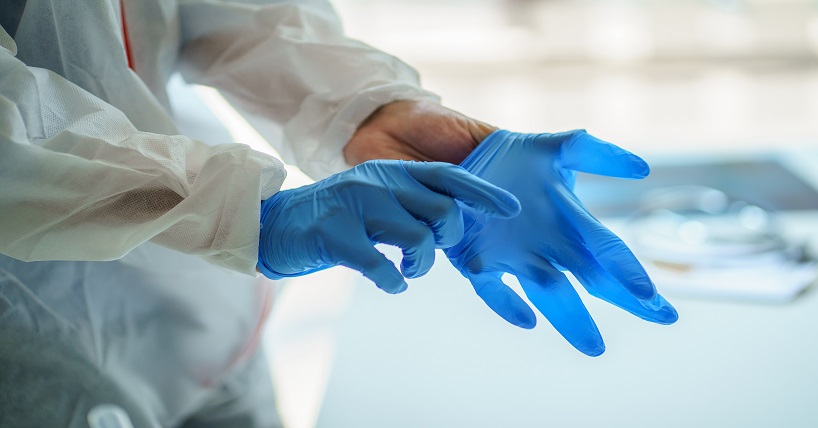Orthotype
New genetic tests set to advance orthopaedic care
Published on: 27 September 2022
A range of ground-breaking genetic tests that could help predict whether joint replacements succeed or fail have been launched following years of research.
The MHRA-registered Orthotype tests from ExplantLab were developed with the backing of Innovate UK and the Academic Health Science Network for the North East and North Cumbria (AHSN NENC) in collaboration with Newcastle University and University Hospital North Tees, Nuffield Health Tees Hospital, Hospital for Special Surgery (New York) and Royal Perth Hospital. Using next-generation genetic sequencing, the tests identify genetic markers in saliva or blood samples for specific variations of HLA genes which, if found, indicate patients will develop an adverse reaction to the cobalt chrome (CoCr) contained in many joint replacement implants.
David Langton from ExplantLab explains: “By sequencing DNA in saliva swabs and blood tests from joint-replacement patients around the world, we established that those who suffered complications carried specific variations of the HLA gene family. We then used our findings to develop a machine-learning algorithm called Orthotype that uses genetics to accurately predict whether a patient is at risk of reacting to a joint replacement made of a cobalt chrome component, often referred to as an adverse reaction to metal debris (ARMD) or metal hypersensitivity.”
Professor Tom Joyce from the School of Engineering at Newcastle University said: “The published research conducted with ExplantLab has demonstrated the accuracy and robust nature of the test which will help orthopaedic surgeons choose the best replacement joints for their patients.
“This research has shown that wear particles, released from implant surfaces as the patient moves, can cause a response from our immune system and this appears dependent on the type of material, amount of debris released and patient factors. By bringing these factors together in Orthotype, a test is now available which could benefit thousands of patients.
“This development strongly demonstrates how academic and industry partnerships can lead to lab based studies becoming successful commercial products.”

Unmet need in orthopaedics
Worldwide it is thought that between 10-20% of total joint arthroplasties (TJA) are revision surgeries, required because the original implants have failed, with up to 44% of failed knee joint replacements showing evidence of an adverse CoCr reaction. While the complications linked to revision surgery are similar in nature to those associated with a first-time replacement, the risk of any single complication occurring is significantly higher. This places a considerable toll on both patients and health services.
To date, a lack of specific implant-related hypersensitivity diagnostic tools has made it difficult to diagnose metal hypersensitivity in post-operative patients. Risk factors have been unclear, meaning surgeons have been unable to predict how well a patient may tolerate an implant.
Aiding clinical decision-making
By assessing whether a patient is likely to develop metal hypersensitivity, the Orthotype suite of tests can help ensure more implants are well-tolerated first-time round, in turn lessening the need for post-operative chronic pain management and repeat surgery. As a result, this could deliver better orthopaedic outcomes for patients and help ease the clinical backlogs that have built up since the pandemic.
Mr Jeremy Latham, Consultant Orthopaedic Hip Surgeon in Southampton said: “We know that the majority of patients have an excellent outcome following joint replacement surgery. However, some people undoubtedly have an adverse reaction to implants that are made from cobalt chrome alloy. In the age of personalised medicine, this type of innovation represents a significant advance in orthopaedic care, providing surgeons with information about the host factors that influence the outcome of surgery. This will help them and their patients to make better decisions about the best treatment.”
Proven algorithm
The science behind Orthotype is based on 15 years of international research involving over 600 patients, 176 of whom experienced prosthesis failure.1 It found that metal hypersensitivity is associated not only with patient age, gender, and the levels of metal debris in the blood, but also the presence of certain HLA class II alleles.1 Researchers used this insight to inform and validate an algorithm to predict the likelihood of development of a serious disorder called 'aseptic lymphocyte-dominant vasculitis-associated lesion’ (ALVAL) at an accuracy (1.8% probability error) suitable for clinical use. The addition of blood metal concentration testing means Orthotype can also be used to determine the cause of post-replacement pain and inflammation (with a sensitivity and specificity of around 90%).
Potential benefits
It is hoped that the launch of Orthotype could herald a new surgical era of personalised medicine in orthopaedics in which individuals routinely undergo genetic testing prior to receiving medical implants. AHSN NENC, which supported the research and development of Orthotype, believe that as well as relieving the burden faced by patients, Orthotype’s use in standard clinical practice could deliver cost savings to the NHS. Russell Watkins, Commercial Director at AHSN for North East and North Cumbria explains: “Orthotype represents a much-needed innovation in orthopaedics which has the potential to provide significant financial implications for healthcare systems, through the avoidance of repeat surgery. The AHSN NENC exists to spread innovation at pace through the NHS and I believe the adoption of innovations, such as Orthotype, will lead the way to improving patient health outcomes”.
Surgeons and clinicians can order the suite of Orthotype tests via the pathology laboratory services in their hospitals, including a post-operative combined test that can be used to diagnose metal sensitivity in people who have already undergone surgery and a saliva-based home test kit is also available for pre-operative joint replacement patients to order online via the ExplantLab website.



